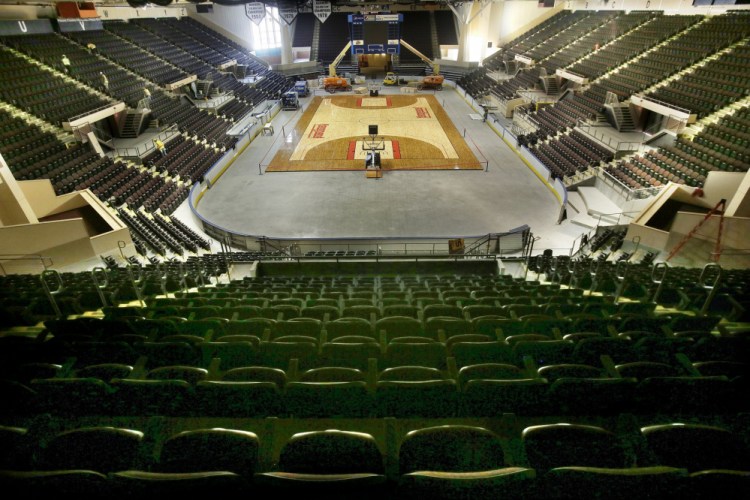Cross Insurance Arena ended its last fiscal year $85,000 in the red, a loss that would have been wiped out if only the arena’s ceiling were a bit higher.
The arena wasn’t able to book the immensely popular Cirque du Soleil act because its 45-foot ceiling is about 5 to 10 feet too low for the flashy, aerobatic shows. Operators had budgeted $130,000 in revenue for the expected Cirque du Soleil shows before realizing the space couldn’t accommodate the latest version of the act.
As it was, the civic center’s operating loss of $85,000 for the fiscal year that ended June 30 was a substantial reduction from the loss from the year before. The downtown Portland arena had an operating loss of $600,000 in 2014-15. Both operating losses don’t include about $2 million in annual bond payments to pay for the $34 million 2013-14 renovation of the arena.
Income from renting out the arena, which is owned by Cumberland County, came to nearly $2.1 million, while costs were nearly $2.2 million in fiscal year 2015-16. Before the year began, the arena management projected a surplus of nearly $40,000.
Matt Herpich, the arena’s general manager, who works for Spectra, the management firm hired in early 2015 by the county trustees, said he’s pursuing a scaled-down Cirque du Soleil show this year. The troupe ended up performing in Maine in June, but in Bangor. Tickets to the shows there cost up to $139.
“I would love to have a Cirque du Soleil show every year,” Herpich said, because it brings in a reliable crowd, usually for a run of four to nine shows.
He said one version of the touring show doesn’t require as much clearance, so he’s pursuing a booking this year.
Herpich said the arena fell short of the number of events it anticipated for the last year, with 123, compared to a projected 148. He said most of the shortfall was in banquet events held in the arena’s smaller rooms, so the financial impact of that shortfall wasn’t significant.
Herpich and Mitchell Berkowitz, chairman of the county-appointed trustees who oversee operations of the arena, said the arena will have some more flexibility this winter because there won’t be an American Hockey League team playing there. In May, the Portland Pirates announced the team, which had played at the arena for 23 years, had been sold and would move to Springfield, Massachusetts, for the upcoming season. The team and the arena board tried to renegotiate the lease, but were unable to reach an agreement.
The arena’s trustees and a group interested in bringing an ECHL hockey team to Portland are negotiating a lease for a new team to begin playing in the arena for the 2017-18 season. Godfrey Wood, the lead person trying to put together the deal, has indicated he wants a lease in place by the end of this month so investors can pursue either an expansion team or buy an existing ECHL team and move it to Portland.
The ECHL is considered one step below the AHL in hockey’s minor leagues, but because of strict salary caps and the lack of affiliation fees paid to National Hockey League teams, it’s possible a new team would be able to cut ticket prices below what they were for the Pirates, potentially leading to increased attendance.
The arena ended up taking in $33,000 more from hockey operations than it anticipated in fiscal 2015-16.
While the lack of a hockey team could cut into revenue, it also opens up more dates, particularly on weekends, for concerts and other shows at the arena, Berkowitz said.
“That’s an opportunity for management” to use Spectra’s national connections with tour promoters to bring more acts, he said.
Berkowitz noted that the arena was able to land a Phish concert in early July, typically a slack time for indoor concerts.
“The Phish concert was big and maxed out and that’s at a time of year when we don’t usually get many concerts” inside, Berkowitz said.
The trustees hope that the big decrease in the loss between 2014-15 and the past year has generated “momentum” that will lead to an operating profit for the current fiscal year, Berkowitz said.
However, he said, that may not mean relief for county taxpayers paying off the renovation bond. The arena, he said, wants to start setting aside money for future repairs and upgrades.
County officials said 2014-15’s costs, which totaled about $3 million between the bond, operating loss and some capital investments, amounted to about $30 a year in taxes per county household, although the exact amount varies based on a home’s value.
Copy the Story LinkSend questions/comments to the editors.




Success. Please wait for the page to reload. If the page does not reload within 5 seconds, please refresh the page.
Enter your email and password to access comments.
Hi, to comment on stories you must . This profile is in addition to your subscription and website login.
Already have a commenting profile? .
Invalid username/password.
Please check your email to confirm and complete your registration.
Only subscribers are eligible to post comments. Please subscribe or login first for digital access. Here’s why.
Use the form below to reset your password. When you've submitted your account email, we will send an email with a reset code.